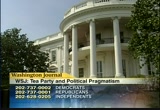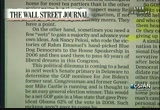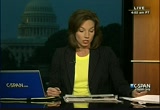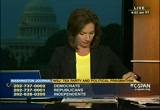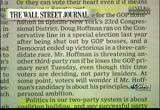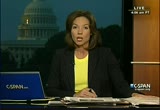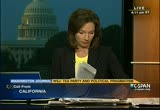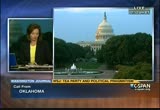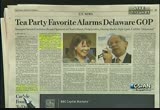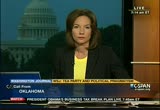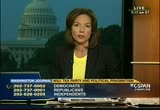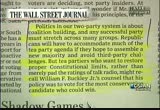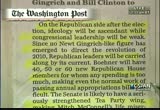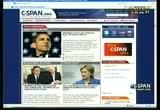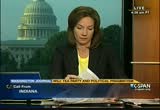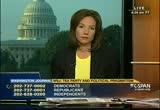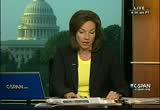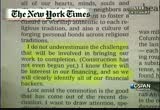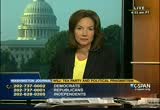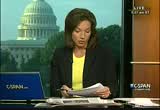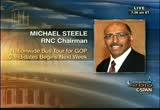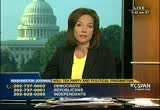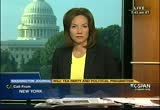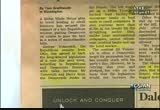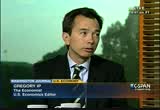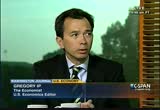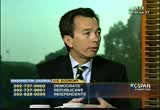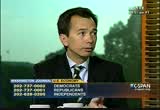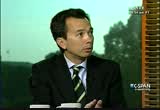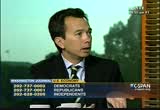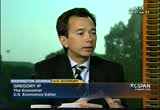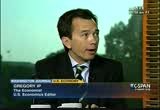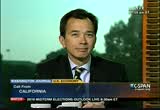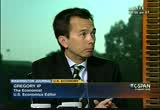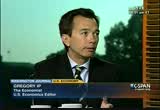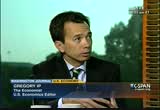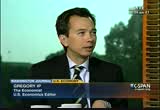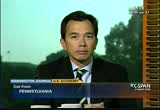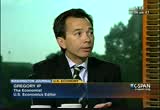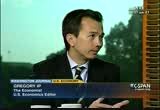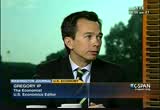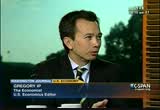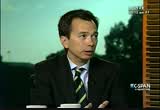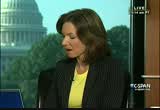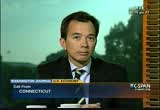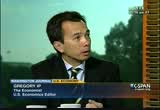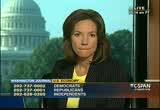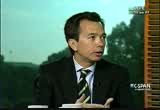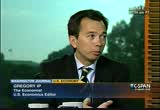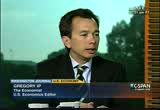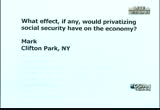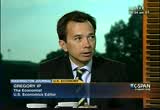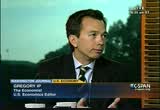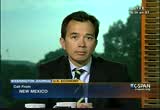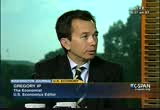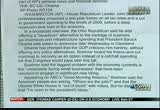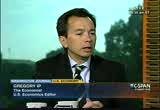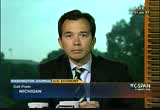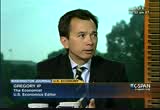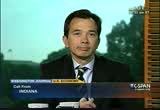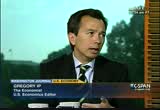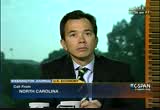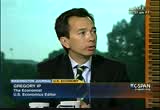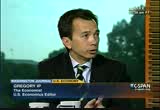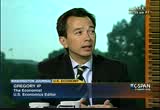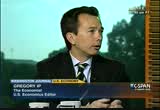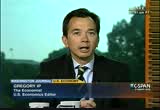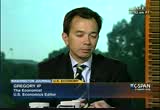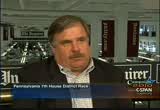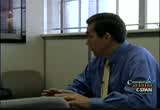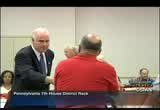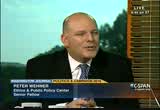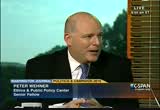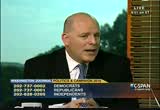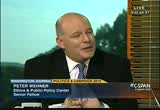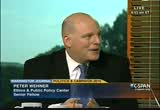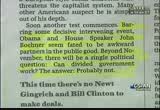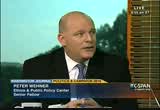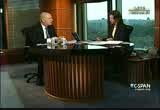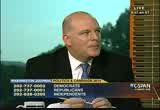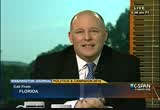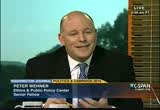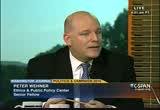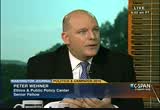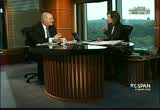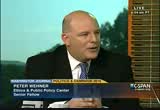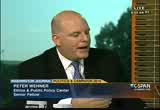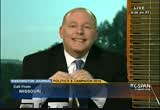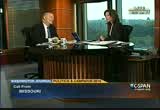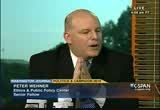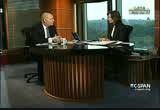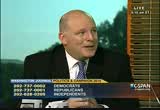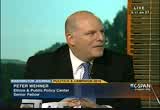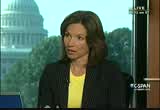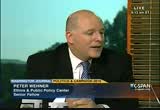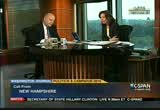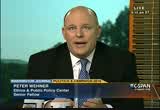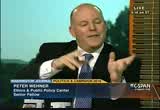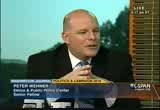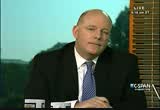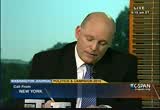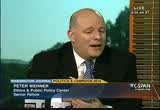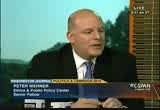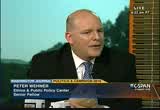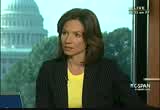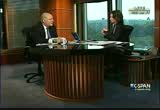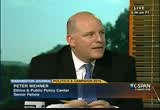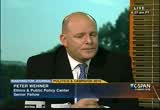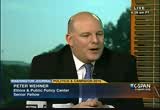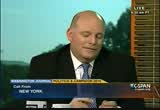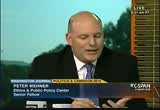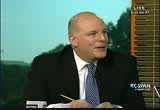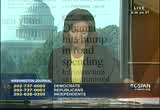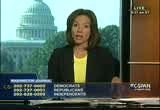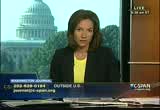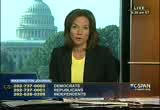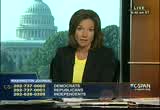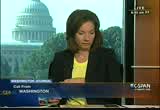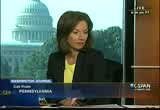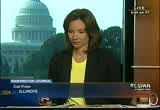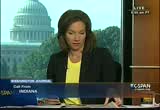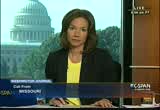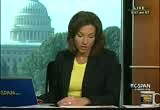tv Washington Journal CSPAN September 8, 2010 7:00am-10:00am EDT
7:00 am
7:01 am
"the wall street journal" is calling for tea party members vote for the most conservative candidate that could win. the senate that the where primary seat is a test of political pragmatism according to the party. what you think about that? we have a special line set aside 40 party members. to your to-628-0184 -- 202-628- 0184. "the tea party movement has largely been a boon for the country, wrote in the case for a properly understood constitution
7:04 am
host: first phone call on this, sarah, the key party and political pragmatism. -- the tea party and political pragmatism, what do you think? caller: the tea party is a force to be reckoned with, i am not a member but i do understand them. in a democrat and i can understand their fears, anger, and frustration. host: you are concerned about tea party members actually being able to win in a general election and have an influence in the senate? caller: i do not know if i am concerned, but i am concerned about anyone being motivated by
7:05 am
fear and anger. if you look in the mirror and you are motivated by fear and anger, you are not behind anything that will be prosperous or positive. bringing us a better america where we are not fighting all the time. abraham lincoln even said this. we will falter with them, it will not be an outside force. just look in the mirror. host: all right. independent line, connecticut. caller: a quick comment, it is hard to tell where to party members stand on the issues. if you look at rand hall in kentucky, if you look at the way that they have been constructed and guided, not to speak critically on the issues, it is
7:06 am
7:07 am
7:08 am
circular firing squad. we need to vote for the people that can vote for the republicans who can win the election and make significant gains in congress. i also believed that the republicans defeated in these primary should about gracefully rather than pursue other venues of trying to get elected. what it will do is one that splitting the republican vote. the only ones to win there are the democrats. host: you would like to see leave some rakowski about out of the race? caller: sometimes you just have to accept a fee -- you have to accept -- the feet -- defeat. host: on this list from "the washington journal" to have a
7:09 am
list." west virginia, carl, tea party member, what you think of this call for political pragmatism? caller: i would vote for any party that supported small government. i was disappointed in george bush jr., who increased the size of government. i have been to these key party rallies, as far as i can see is just a bunch of good american people who are for smaller government, they are about getting government out of the way and letting the economy boomer. i want to tell you, this is the most left-wing program i have ever seen. host: left wing? are you there?
7:10 am
we lost him. clearwater, florida. caller: one year ago these not jobs were bringing a loaded assault rifles to peaceful town hall meetings and now they are burning books in gainesville, florida. this is crystal love -- krystalnacht all over again. host: i do not think you can make the correlation between tea party members and the preacher in florida. caller: by disagree. remember, the definition of fascism is the far right. and i will say, i call them teabaggers. they are dangerous. host: we will move on. ellen, pennsylvania. caller: good morning. that lady that was just on, she is the worst one going. i think that the tea party is a
7:11 am
dirty name in it is so long. host: why? caller: the tea party gets a bad name, they are human beings and they have an opinion. host: what you think of "the wall street journal"? republicans need to be pragmatic? if you have a tea party candidate they cannot win in a general election, is it wise to vote for a more moderate republican? caller: yes. host: you do? caller: yes. host: would you call yourself a moderate? caller: i can, but i do not want to. you know why? there are so many hot heads on the other side. obama is doing so much for the unions and frankly, i think they will ruin my country. host: in this -- pennsylvania senate race, do you think that
7:12 am
pat to me is a moderate? caller: i think that he is very sensible. host: james, democratic line, your next. caller: i think that the bankers are backing up the republican party. why? they are deliberately tying up the money. why? they want to republicans in. why? tax breaks. when you make $200 million per year, you want the tax breaks. so, they are jamming up our society. it will look like the democrats are not doing nothing, that is how it would appear, with republicans getting in to extend the permanent tax breaks. if you are an independent voter, both independent, don't
7:13 am
put the party in the factory that caused the problem in the first place. vote for the green party. host: lance, a tea party line, oklahoma. caller: i think that the editorial has it wrong. i think that the basic conflict in politics is not between conservatism and liberalism, it is between classical liberalism and progressivism. "the wall street journal" fails to recognize that the tea party members start to elect these so- called pragmatists who are completely undermining the entire basis of what the t party is about. the tea party is about throwing a tea overboard and saying enough, we need an entire new slate, an entire new order of the ages when it comes to
7:14 am
american politics, going back to why and where this nation is one of freedom and very limited government. host: hang on the line, let me read from "the wall street journal" this morning on the tea party raised in delaware. host: what do you make specifically about this race? did you follow it? caller: i have, and it is a good point to make, because it is the difference between the importance of personality and the importance of policy.
7:15 am
because i would much rather have a somewhat mentally unstable person who may be does not know the difference between whether she won a couple of counties in a of articular race or may make very bizarre remarks about whatever and a politician on the other side who would support an extremely intrusive and extremely suppressive cap and trade system that would benefit only certain very big businesses and stomp out market competition, making us all -- poorer as a result, leading us down the road to perdition. i will leave it there. host: thank you for calling in this morning. we are told that president obama
7:16 am
will be giving another economic speech from cleveland, ohio, it will be on c-span 2 at 2:10 p.m. on c-span 2. we were talking about that senate gop race in delaware. we want to show you more about that. >> under president obama we are increasing debt at a rate we have never seen before and i do not know how we will be able to work our way through the problems we have if we continue to spend at these levels. we need to say that enough is enough, we have to give everyone the opportunity to do better for their families in this country. >> in 2008, the american conservative union voted mike castele one of the most liberal
7:17 am
republicans in congress. that is why the two-party expressed support christine o'donnell. she opposed the bid -- the bailout. our country deserves better. host: those were the latest advertisement in the gop primary. larry, independent mind, good morning. caller: first off, the gentleman talking about smaller government apparently thinks he is libertarian, because that is one libertarian's actually wants. second, the way that he was talking about the far right being fascist, duh. as far as the teeth party itself, if they could decide what they actually wanted and set out on a course to reach that goal it would help, because they apparently do not have one
7:18 am
vote. host: you have voted for democrats in the past? caller: i have voted for any party the best answers the question. host: who will you be voting for in november? caller: i am not entirely sure yet. host: tea party candidates are out for you? caller: not necessarily, if they have the best answer i would vote for them, but i want to know exactly what it is that they want. host: what is the number one issue for you? caller: jobs. host: what do you do for a living? caller: a dispatcher. host: you mind telling us your age? caller: 38.
7:19 am
host: who is running in indiana that you are looking at voting for? caller: that list is too long. host: all right. caller: that is kind of my point, i have not checked off anyone yet. i really want to vote for the person with the best answer. host: do you think that the tea party movement needs a leader to solidify what they want? caller: i would say leadership, not necessarily one leader. possibly two or three people who, for lack of a better way to put it, have an agenda that would show people what they actually won as opposed to running around saying that we are conservative. that does not matter. host: let me read the last part of the " wall street journal"
7:20 am
editorial today -- of the "wall street journal" editorial today. host: what you think about that? caller: conservatives should not be your only yardstick. it should include things like who will do the most to help the economy. who will do the most to help the people that need jobs. who will do the most to help with the issues that are facing the people out there right now. host: let's go the jonathan, democratic line, south carolina.
7:21 am
jonathan, you are on the air. caller: one of the founders of the tea party movement, he clearly stated that the tea party movement was not affiliated with a party, which is a lie. i have noticed that the two- party is more reminiscent of the george wallace type movement. it seems to be more of the politics of race than any particular issue. i do not know what the tea party stands for. they claim to be conservative, but one of the strategies of lee atwater, the south has never voted for its true economic interests, it has always been the politics of race. host: all right. patrick, republican line, you are next. caller: the lady earlier had a
7:22 am
good point about fear and anger, but the thing that causes the fear and anger is that the government is out of control right now. to me the tea party stands for freedom and prosperity, the more that the government does, the worse things get. if they wanted to bring jobs back here tomorrow, all that would have to do is lower the corporate tax rate. we have all of these groups on the left that want to demonize and redistribute money, forcing socialism down our throats. it is about the ideas of the founding fathers for freedom and liver -- limited government. prosperity comes from freedom, not government control. host: the peace in "the washington post" this morning --
7:23 am
7:24 am
barry? we lost very, hopefully you can call back in. mark, independent line. caller: we have the same problem here as with the senate race. if the democrats could pick up that seat right there, there would be a division between the voters. also, as far as this preacher in gainesville, there is no mistaking that. host: washington, d.c., mark, republican line, good morning. caller: one of the callers said they believed that the left was involved in redistributing wealth.
7:25 am
since 1980 this country has gone from distributing 8% of corporate profits to the banking sector to 40%. 40 cents out of every dollar goes to banking and finance. our entire body of law and all of the regulations that enforce the law are designed to handle a huge amount of profit to a sector of the economy that produces nothing of value. why are people on the right not talking about the redistribution of wealth to the banking sector? caller: -- host: how do you tie this to the banking sector? caller: ron paul originally talked about auditing in the being fiscally conservative, but i am concerned that the tea party has picked up to many other interests, starting to turn in to the extreme right of the republican party and my
7:26 am
guess is that the worst-case scenario will happen, they will elect a bunch of people who look exactly like the republican party and it will not change anything. host: kathleen parker wrote in "the washington post" about the president's choice to go to cleveland, ohio, where the house minority leader gave a speech on the 24th. if you are interested in that speech, you can find it on our website, c-span.org. what she says about this is that he does not get it. "no one is a -- enjoying his attempts to demonize john bay near than john maynard. in the process, elevating the prey. when the administration called rush limbaugh the leader of the republican party, no one was
7:27 am
more delighted than rush limbaugh. host: butler, indiana, your thoughts? caller: i appreciate your taking my call. as a tea party member, i cannot stand republicans or democrats. the thing is, we will have a problem watching republicans saying all these few things that they believe, acting like they are one of us, but once they get into the white house they will go back to their own business. host: why do you say that? take someone like scott brown, who had support from tea party members. what you make of how he has voted since he came to the
7:28 am
senate? he did not get the seat completely from key party support, but what do you make of that? caller: typical politicians. the tea party movement is a core american belief system that has been around for 250 years. it is a bold idea coming to the surface, so it will take a while to settle in. we will have to take our lumps and deal with things for quite some time. it has nothing to do with obama. look at the presidential election, mccain and obama were aggressive -- were progressive his, both of them. the simple idea of our founding fathers, the idea of freedoms, this is not a new idea, politicians use it to confuse
7:29 am
the common sense voters. we will have to take on america. john mccain was not conservative, he was progressive. host: what about j.d. hayworth? caller: you have got to look at things and say, all right, this is what we're going to do, we are going to take these politicians and give them term limits, but then it is up to american voters to be active and use common sense. if you are a business and have two dollars, you cannot spend three. many voters said the this was the republicans, but no, if you do not follow the constitution and do not believe that the founding fathers had the right idea for limited government and low taxes, you are not one of us. host: let me ask you two
7:30 am
questions. who began the tea party movement? caller: ron paul had it right on the head. host: so, should ron paul be the leader of that movement? caller: we do not want a leader, as soon as you have one, all of your enemies point your rifles that you. i serve the the military, i love my country, but i cannot stand by government. i could not stand by government when bush was in their. once we can have a common-sense approach, how come as soon as people ask questions we have to be labeled. i am an american that love my country and it has nothing to do with hating obama, it has to do with this idea of the government knows best. host: in usa today, the new study saying that voters have not been there for democrats in primaries.
7:31 am
one caller brought up the situation in florida with it the pastor planning to go ahead to burn the koran this saturday, september 11. this morning is a piece written by imthe imam and chairman of the cordova initiative. he is the chairman behind building the mosque in new york near ground zero. he writes "many people wonder why i did not speak out sooner about this project. i thought it be better that i address these issues when i return to america.
7:32 am
"i do not underestimate the challenges involved in bringing our work to completion. as i traveled overseas, i saw firsthand how their words and actions made an impact on muslim leaders. it was striking. a christian president and a jewish mayor of new york, supporting the rights of muslims." the story about a pastor in florida made the front page of "the philadelphia inquirer" this
7:33 am
morning. general petraeus said that americans could be hurt, but that the small florida church is not backing down." the front page of "the new york daily news" says that it is distasteful constitutional. michigan, independent line, we are talking about the tea party test of political pragmatism. that is the editorial in an "the wall street journal" this morning. caller: we want smaller government, whatever, you get these kinds of things like the government being too big, we do not want this, that, whatever.
7:34 am
so, the let us for this government job, even though we are telling you how bad the government is. they will get in there and guess what, they will do nothing, they will not vote for anything, just like the republicans. is that not kind of like welfare? they will be getting paid for nothing, i thought they were against that kind of thing. host: catherine, good morning, you are on the air. caller: we are not going to get anything done until the government works. whether or not you think it is big or small, you have to work with the job.
7:35 am
host: perry, independent line, good morning. caller: i am concerned about the country just like the tea party, but on the other hand, the idea of throwing out mike castle after a lifetime of service to delaware, a person who reflects the interests of delaware, does not make a lot of sense to me. i happen to personally know him. not now, but i went to college with him. since then we have not been in contact with each other, but i did follow his career. he is a pragmatist. he has strived to work with democrats on some issues to get things done. this notion of purity, they recently throughout the republican serving in the eastern shore of the maryland first congressional district, turning him out this last
7:36 am
election round. gilchrist was his name. what happened? they elected a democrat in maryland in the first congressional district. what will they do? they will throw out a practical person who has devoted his life to the republican party and they will throw him out and probably wind up with a democrat. this purity business that "the wall street journal" is selling does not make sense. host: but we heard last night, that mayor dayley is going to retire, what will it mean for chicago? you have probably also seen the stories and the chatter on the talk shows from last night, whether or not rohm emmanuel
7:38 am
host: we are talking about the tea party and test of political pragmatism. hopefully we will get more phone calls, but first we want to get a political update this morning. we are talking with patricia miller about the dnc and rnc campaign plans. caller: tim kane is starting with a midday speech at the university of pennsylvania and philadelphia, contrasting democrats with republicans, talking about banking reform and health care as republicans take control of the house. going to pennsylvania, a state with a lot of races going on.
7:39 am
host: on the republican side, what are the plans for michael steele? caller: michael steele is going to start a bus trip going across the country, making stops at all 38 states over six weeks. some of those stops will be fund-raising stops, others will include candidates. the rnc is very behind the dnc in fund-raising, so they need to make up the difference without spending a lot of money. host: how are these cuts -- these two, these outside parties and outside groups, how are their strategy is playing out in some of these races? caller: the dnc is doing a lot more to defend seats if they
7:40 am
can, the rnc is doing everything they can to go on attack, just like congressional campaign committees on the republican side. host: you wrote a piece about the nrcc targeting mr. donnelly with their first advertisement. what is this about? caller: george donnelly is in a competitive race against jackie larsky, so the nrcc targeted him with their first independent expenditure add this week, basically telling the democratic leadership in the ad taking money from nancy pelosi, talking about his votes for the controversial bills in congress. host: let's take a look at the latest advertisements in this
7:41 am
race and then we will talk about them. caller: sure. >> he voted for the wall street bailout, voted with nancy pelosi. he has taken $130,000 from democratic leaders. now, joe donnelly wants us to believe he is an independent? the national republican congressional committee is responsible for the contents of this advertising. >> they are at it again, smearing joe donnelly. the fact is that he is indiana's most independent congressman, voting against nancy pelosi is an energy tax. jackie worski blindly risks our independence.
7:42 am
host: in the last advertisement be thawed joe mulally not mentioning that he is a democrat. -- in the last advertisement we saw joe donnelly not mentioning that he is a democrat. why? caller: as the narrator was talking about these problems, he is really doing all that he can to distance himself from party leadership specifically. host: is it helping the campaign? caller: debatable at this point, the republican campaign will try to tie him to the leadership, doing the same thing that the second id showed. host: thank you for your time. for more information, go to our web site, c-span.org.
7:43 am
baltimore, republican line, thank you for waiting. caller: yes, ma'am. i would like to talk about the religious freedom issue and the burning of the koran. host: we are talking about the tea party this morning and this editorial from "the wall street journal" that points to the delaware primary for senate, saying it is a real test of political pragmatism. we will go on to oregon, laura, your on the air. laura, are you with us? i think we lost her. we will want to bobby, syracuse, new york. independent line. caller: i've watched a lot of what is going on and i do not understand why people are not giving americans more credit than they deserve.
7:44 am
most average, middle-class americans, they are seeing through the tea party, seeing that things are not changing. for instance, where was the tea party over the last few years with bush cheney? all of a sudden with it the chaos that we have now, the tea party comes out into a lot of average americans it just looks like another part of the right- wing republicans, bashing the democrats and obama who are trying to do some good. our american system of voting, it seems like every time we vote someone in, be it the clinton administration for getting passed another administration, we do not seem to want to vote for each other. i have a banking background and many of us in the network had been waiting for these political parties that was supposed to go
7:45 am
to small banks and credit unions. where is that helping the american small businessmen? caller: let me give you an update on that before you go. "the financial times" is talking about backing that bill that you are talking about, saying that george one of which agreed to back the legislation that a vote last -- and a vote next week, likely able to give democrats the ability to pass this. caller: here is the thing, if you are going to go for political office in your main purpose is not to help america, you should not be in office. the american people should take you out. host: more on the economy coming out with -- coming up with gregory ip, our next guest.
7:46 am
7:47 am
says that health care is a right, not a privilege. let's see what your elected officials have said from across the country. it is all searchable and free on your computer, any time. >> tonight on prime time "book tv," "the battle, the fight between big government and business with arthur brooks." bill cohen discusses race and reconciliation with john lewis michael branam defends the tea party movement with "that is now angry mob, that is my mob." tonight, on "book tv" prime- time. >> "washington journal" continues. host: gregory ip is here to tell the latest on the economy -- talk about the latest in the
7:48 am
economy. what is the overall status? caller: of the economy -- guest: the economy is technically out of recession but growing at an extremely sluggish rate. it is even lower than what you would normally expect coming out of a recovery, when there is a lot of pent-up demand. you would have anticipated growth with a% being well global level. we are coming out of a financial crisis that did a lot of damage, people with a lot of debt that do not support the assets. kind of what you would call a classic post-crisis, the leveraging kind of scenario. host: what about the economic indicators coming out in next weeks and months? what should be worth watching for? guest: most important is the unemployment rate and the
7:49 am
payroll jobs created on a monthly basis. the economy must be growing over 3%, creating over 100,000 jobs roughly. bringing it down by half of a percentage point each year. we have not been meeting the benchmark. the economy hit an air pocket in the middle of the year, and we are not sure why. it might have been because of the european sovereign debt crisis, perhaps something related to the bp oil spill. lots of talks of uncertainty and so forth. lots of economic indicators and manufacturing activity being stronger than expected. host: people say a lot about
7:50 am
what ben bernanke will and won't do with general inflation, what should the viewers be watching for there? guest: there is an old saying that business expansion did not die of old age, it was murdered by the federal reserve. this one was different, they did not raise rates vary high before the recession, the fed brought us as far as they could while of arming the damage, although they have left is doing unconventional things, purchasing bonds to bring down long-term interest rates. they have already spent almost $2 trillion doing that. ben bernanke said that there were two conditions in which he would decide whether or not to do more of that. inflation headed towards a deflationary, or if the economy
7:51 am
starts to stumble, showing signs of not reaching that growth rate, in which case you would expect to see the federal reserve going out to buy more bonds, schering some people that it could eventually cause inflation. not much of a risk right now given the unused capacity of the economy. host: the president will be talking about these latest stimulus proposals. there is a piece in the economist with this headline, " fiscal stimulus makes an uneasy combination." what does that mean? guest: but they're basically saying is that traditionally when the economy is in recession, you look to the central bank, lower interest rates. people going back to purchase houses and cars. getting a be shaped recovery, it is not happening now. even if they purchased bonds to
7:52 am
bring down long-term interest rates, the reality is that you cannot force people to borrow and spend if eat they do not want to. the only way to create economic activity is for someone else to spend. one of the most effective solutions, if things got desperate enough, would be for some kind of fiscal stimulus for the government to borrow more money, then purchasing bonds. again, it is scary to think about, because i affect the federal reserve would be printing money to help the government finance spending. but we have been there before, in world war ii that is essentially what happened. the federal spending that plus under was very effective in bringing unemployment down. but it came at a cost.
7:53 am
7:54 am
guest: i agree completely with what he says in that column. you have consumers, government, and the rest of the world purchasing exports. consumers are normally the number one engine, they'll like 57% of gdp. if you add in housing, savings rates dropped and what happened as a result was we were spending beyond our means.
7:55 am
consumers have woken up to the fact that that is no longer a source of growth and that is why things are sluggish right now. where will we look for the other growth that consumers are not providing? frankly, businesses are not going to spend. governments is right now running very large deficits for that reason, but if you go too far you wind up with a single deficit for the rest of the world, looking at other countries like china and india, europe and germany, to pick up the slack, but it is not easy to do. looking around every country is counting on exports to do the same thing and unless we start to find customers on mars, that is not going to work. host: does that mean that under
7:56 am
the scenario that you explain, the new industries and new technologies, this is a long way out before we see the jobs numbers we saw before the recession? caller: it could take a decade before we get there. indeed, it may never actually get that low again. that is going a bit too far, but there are reasons that economists talk about structural unemployment going up. for those jobs are not coming back, even when the economy is reasonably recovering. they will have to retrain into something else. the other problem is the long- term unemployed that we have. the longer the people go without a job, the more that their skills atrophy and they lose the habit of showing up for work on time. this will be a very slow climb
7:57 am
back. host: gregory ip is our guest this morning and the author of "the real world book of economics." if you are confused about economic terminology, this book explains them. joanne, you are the first phone call on the democratic line. caller: my complaint is the banks. i have found that the banks are willing to auction off our homes rather than have people negotiate with us on them. if the auction off a house, they lose more money and then they are supplemented by the government at a higher rate. that is why none of the banks are negotiating with people who are losing their houses. the government's is losing
7:58 am
nothing. the president, congressman, none of them are doing anything to help us. host: i sympathize with what the caller is saying, where millions of homeowners cannot get out of their mortgages. they keep putting that money into declining value assets. they rolled out several programs that are designed to alleviate the question. subsidizing the banks and homeowners willing to lower the principal payments, people that have run into a hardship because of unemployment staying in their home, they have also asked fannie mae and freddie mac to lower the mortgages, even if the homes have declined in value. the real problem is that people whose homes are worth substantially less -- substantially less than what is
7:59 am
left on them, they have very little incentive to keep making these payments. when you have a situation like this, it just jams of the financial system. you have banks with literally hundreds of billions of dollars in loans, they will not give the caller a break because they do not want to give it to someone i cannot give it payment and they do not want to agree a excuses for people and not make payments. and the economy suffers, because the less able they are to get credit the less new businesses can grow. host: republican line, good morning. caller: good morning, thank you for c-span. i would like you to agree or disagree and comment on what i have to say. yesterday in the far i heard
8:00 am
robert gibbs giving a press conference talking about the bush tax cuts, and referring to those who make $400,000 each year to $800,000 each year, that they do not necessarily need the tax cuts. that they will continue to spend. he referred specifically to purchase and televisions. i thought that was comical and i laughed out loud. televisions? people who make $400,000 each year are investors. they invest in real estate. they create small businesses, create jobs. he refers to television's? host: are you one of those folks? caller: i make $150,000, my folks make substantially more and i can tell you that they have invested in real estate
8:01 am
8:02 am
it does give them an incentive to earn less or plan ways to hide their income. those are questions that need to be addressed. from a political point of view, we are and a -- we are in a system where people are avoiding the upper tax revenues. that is because the wealth distribution is unequal. at some point, we are asking for bigger government, asking for government to do more. it should seem reasonable that
8:03 am
we ask all taxpayers to take part in the system. host: president obama talking about this today. convincing democrats that letting the tax cuts for the baltics by is a good idea. that is in the "new york times" this morning. he will give that speech at 2:00 eastern time. "the wall street journal" had lined is -- headline is -- but the businesses are staying that is okay, we see the benefit, but it is limited. when they would prefer it is to not allow the tax cuts to expire for the wealthy. guest: let's look at the
8:04 am
research and development tax credit. congress does not really have the moxie to identify the long- term cost. each year it expires and they have to renew it. this creates a lot of uncertainty. corporations who do high-tech development stop doing some of that research until the tax break is renewed. making it permanent would create some nice stability that would encourage research, but because business is expected to be renewed, you will not get all of the new activity that would happen anyway. giving companies the option to take the full production on their equipment this -- deduction on their equipment this coming year, that gives them incentive to accelerate that they would have done in the next coming years. i think the benefits will be limited, though, for the next
8:05 am
couple of reasons. the main reason businesses are not investing is not because it is expensive, it is because they do not have sales. past tax breaks under george bush -- the advantage was very slight. cash for clunkers. he did not make people buy more homes and day -- cars -- and they already would have. after the credit, activity dropped off, and that could happen here. there could be a big surge in december followed by a dropoff. host: of vernon in pennsylvania. caller: i had a comment on the economy. ending, now going to afghanistan, with the money
8:06 am
we spent there, we could have built up our homeland, implemented health care in the u.s. i live in a small town, one of the most popular stimulus cities in pennsylvania. there is nothing but dead land here. we build up this world from nothing. we should we invest -- invest the war money here. guest: as the war winds down, some of that money will be saved, but at the same time, no more in afghanistan is ramping up. our entire defense budget is only about 5% of gdp. we could cut every penny we send
8:07 am
to the pentagon and we would still not be even halfway to the budget deficit. as far as reinvesting in our cities, economy, and so forth, absolutely that is essential. a lot of that will come with the national -- natural process of businesses doing work. certain industries, who were once in dealing with steel, are finding new areas to work in, such as health care, pharmaceuticals. the obama administration is trying to take modest amounts of money to invest in public infrastructure, green technology, but the amounts will not make a difference to the cities where you live in the next 12 months. host: of the infrastructure spending, $50 billion. how would that work?
8:08 am
when it helps cities and states? guest: sure, it would. lots of cities are not doing maintenance to highways, mass transit systems, because there are strapped for money. state budgets are not like the federal budget. they have to balance the budget every year. when the income tax collapses, they have to take major steps. you see in harrisburg, they are defaulting on their bond payment. host: philadelphia. genie on the republican line. caller: good morning. i have one question for you. i understand the president will be traveling the country trying to propose a new stimulus. my question is, if money had gone into infrastructure from the original stimulus, why do we
8:09 am
need a new one? it seems government jobs have been expanded like crazy and the private sector has not. also, do not give tax credits to people who are in the $400,000 a year range. these are people that create jobs for the country. why do we want to deprive them of the opportunity to give jobs? host: let me read a little bit from "the washington post" on this issue, extending the tax -- guest: that is interesting. it was like a massive game of
8:10 am
chicken. we dare you not to pass the middle class tax cuts. the middle class saying, we dare you not to pass the upper class taxes. with everything ending come in it would be very bad, considering the soft state of the economy. to your call, you are expressing something that is out there. the president had a stimulus of over $800 billion and we still have unemployment near 10%. why are we doubling down on that? one of the things with the economics -- if you want to see if a drug works, you have to look at 100 patients and see who does better. the economy is not like that. you cannot do experiments like that. at a time when the private
8:11 am
sector is paying down debt, the only game in town for the public sector to spend more. most non-partisan economists agree if the about a stimulus did not happen, the recession would have been worse. is that a reason not to do more? i do not think so. it is sort of like diminishing returns. the second cup of coffee dust on wake you up as much as the first. the most obvious trouble-ready project have been financed. what will be going into infrastructure now, increasingly marginal projects. one of the complaints that has been made, money has been spent on highways where there were not many people, but that is where the boats are.
8:12 am
host: let me show you two headlines about what president obama is proposing. anwhat, politically, is the reality of this proposal being put forward by the president and democrats, that it can pass before they leave before the november election? guest: politics is larger than the economic portion here. the amount of money is relatively small and it will not have a big impact on the economy but of a suspect the main reason they want to do this the way they were was not for economic, but political
8:13 am
impact. the president had two tax breaks that he wanted. they like to have that as a message going into the midterm election, saying that these are a bunch of tax-and-spend liberals. there are only a couple of weeks left before congress comes back and leaves again before the midterm session. they are trying to pass the small business lending initiative. i think the odds of the infrastructure piece being passed to our next 20. possibly some better opportunity for the business tax cut. the only thing is, the house of representatives have voluntarily promised to find offsets elsewhere in the budget for everything that they do, so whose taxes are going to go up to pay for these things?
8:14 am
that is the question. host: it is reported dead toward one of which has agreed to support the small business bill. -- greg voinovich has agreed to support the small business bill. do you believe that things could be attached to this, do they have to go through their committees? is there time to go through the political marker process before it goes to the floor? guest: in theory, yes. there might be a depreciation title in the small business lending bill that could be rewritten to accommodate, for example, the tax cut proposal. the problem is finding a way to pay for it, if they are going on pay go.
8:15 am
that is the tough part, finding those things. charles grassley, the ranking member of the senate finance committee on the republican side, has expressed strong opposition to raising anyone's taxes to pay for this thin. host: bill in california. good morning. santa rosa, california. all right, i'm going to put you on hold. russ, windsor locks co, connecticut. caller: i wanted to talk about the stock market. the way i see it, the rules have changed in 2000. it is not the gravy train used to be.
8:16 am
the stock market, in 2000, started at 11,000, moving at a 10% growth rate. it should be pushing 32,000 now. we are over 20,000 below where we need to be to get a 10% growth rate in the stock market. in fact, the market so far in the 2000's is down 10%. your management fees for mutual- fund, it is not the gravy train it has been. i do not believe with that 20,000-point deficit ever will be. you ask why people do not have money, why they do not feel rich, this is a huge part of it. people have been promised a lot and there is not much happening. there was a complete rewrite of
8:17 am
the rules for the stock market. guest: let me be clear, i am not giving investment advice. and the rules really have not changed. back in 2000, when the stock market was 14,000, the price-to- earnings ratio was about 30. today, it is about $15. you are paying about half of what used to for the sake earning power. that is positive for potential returns, going forward. but if you look at other things such as stagnation, deflationary, yes, it would be bad for the market. but if that's if you wish and does not materialize, it would not be an overvalued market. host: greensboro, north carolina. roger, republican line.
8:18 am
caller: i have been working hard. host: i am going to put you on hold and ask you to turn down the television. we will go to texas. eric on the independent line. caller: the stimulus that president obama wants to do, i think it is going to fall the same way it did before. it seems to me, these stimulus packages are making our economy go defunct. host: what do you say that? caller: i hear what some of the callers are saying about barack obama being socialist-minded.
8:19 am
host: let me ask you this. what would you like to see the president to on the economy? caller: i could quote thomas jefferson where he said the truth. of our constitution is for the wisest to invest, states are independent, as do everything within themselves. host: would you like him to do nothing, no more spending? caller: i would like him to get back to the natural principles of our constitution, and not only that. host: "the financial times" says this is what president obama should do to stimulate the economy --
8:20 am
gregory ip, what about the issue of payroll tax holidays? economically, what impact would it have? guest: it would be a nice impact for the economy, it would depend on how long it lasts, but it would be nice for workers. it would be cash flow to businesses. it may actually be incentive to hire a few more workers, but it is very, very expensive. postcode is that why it was taken off the table? -- host: is that what it has been taken off the table?
8:21 am
guest: it seems to be. none to you get into a showdown with the republicans and risk having all of them expire? host: this is from 1 beaver -- viewer -- guest: in a much more serious situation. if you want to know why the great depression became great, it was precisely because so many banks were allowed to fail. you started with a garden variety recession and bad banks started to collapse around europe in the united states, and authorities did almost nothing to stop it. the steps the federal reserve took to lower interest rates, pushed money into the bank's prevented what would have been a great depression. it is hard to make the case that the stimulus was quite has
8:22 am
successful. of course, we can look at the situation if that did not happen, but i am convinced the economy would be weaker without the stimulus. host: do you write about this in your book? guest: sure. traditionally, economists do not think stimulus is a good idea, and for reasons we have heard this morning, governments are so tempted to do the politically stimulative things. by the time you have cut taxes, given money to states, the recession is over. for that reason, we usually ask the federal reserve to manage the business cycle. now there is one time when that rule does not apply, and that is
8:23 am
when they are, of ammunition, when the interest rates are near zero. that is the situation we are in. in that case, the case for doing fiscal stimulus is much stronger. host: gregory ip is the u.s. economic center for "the economist." you were talking about deficits earlier. here it is something from a viewer. guest: none. the money has to be raised some help. there are people who advocate your social security payments, instead of going into a government trust fund, should go into the stock market. the government would simply have to get the money that they were relying on somewhere else.
8:24 am
it might be helpful if people got a higher return. the stock market might be better than the ious's that the social security trust fund invests its money in. on the other hand, you could have a bear market, as we have had, and people are finding they have a lot less money to retire on. host: speaking of a living wage, this is from a viewer. i want to take one part of it and ask, what will be the future of median incomes. what will be the average income? how far will that be able to go? guest: that is one of the most important questions. i think it will be rock for the next five years. one of the things that have been during this recession, employment among women held up much better than men.
8:25 am
manufacturing, airlines, those types of industries have shed a lot of drums and many will not come back. it will be an economy where everyone will have to rely more on training, creativity, education. but at the same time, having spent a lot of time looking at this question for my article, book, i remain pretty optimistic. americans are very good and responding. it is not like japan. you had a very successful 30 years after rebuilding. they needed a sense of accomplishment, to look at how the western countries were doing it. but once you come up, to keep growing, unless you are willing to let old industries die -- other countries do not have
8:26 am
companies like google, apple. that is one of the great things about the united states, we are always recreating ourselves. the other great thing -- which is often forgotten -- we are a relatively young country. we have a high level of immigration, we have a higher number of children, so things are still looking pretty good. in the short run, in the next five years, in bill be a tough slog, but i remain optimistic. host: questioned in new york. democratic line. -- christian in new york. caller: i have a quick comment. i was working full time, i was a private business owner. i got hit by a drunk driver and
8:27 am
it knocked me into the social security system, disability. i noticed there is a 2% increase every year last year, this year, there is nothing, obviously. i have not heard anybody say anything about the increase. we feel like we are a loss group of people. the other thing, and the transfer fee waiver talking about -- the other end, the
8:28 am
transfer fee they were talking about. -- the other thing, the transfer fee they were talking about. people are not buying into it. host: a few things for you there, great. guest: let me take your last question first. no, nothing the president has done well regulate what your taxes are. and the government is still good on promises it has made to social security retirees. whether it will be 20, 30 years from now is another question. the first point you raise about people on social security not receiving increases, that is a reflection of the fact that inflation has fallen to such a low level. hotels, gasoline, lots of things are not going up in price very much. that is what happens in
8:29 am
recession. it is harder for companies to raise prices and wages. that may not reflect policy and circumstances. the cost of living increase is geared to the average across the country. host: a tweet -- guest: it depends on where the debt is. the problem is, a lot of that debt was brought up in the past 10 years, specifically to buy houses, which are no longer what they were. you have a small group of people, who are well-off, and they do not have any debt at
8:30 am
all. then you have younger people in households who have taken on a mortgage. now they are in dire straits. it is those people who are facing difficulty, and that is what is holding a the economy back. host: it was reported that john container is proposing a two- year freeze on tax cuts and returning to levels of 2008. guest: it looks like he is responding to the president's aggressive foray into politics this week with his own. at least there are talking, there is something on the table. this is washington. we know that most of this is planning to the gallery. what is produced in a compromise would be almost secondary. host: a two-year in taxes, returning to debt levels of
8:31 am
2008. what would the impact of that be? guest: that is essentially what people, like peter orszag, martin feldstein, other economists, have called for. cannot raise income taxes as their schedules to do -- do not raise income taxes as they are scheduled to do, for anybody. the spending one is a bit tougher. it would be rather hard. i do not believe democrats would agree to that. host: tom on the democrat's line. michigan. caller: i would like to offer some criticism of the economic community. the essential problem we have here is we have allowed the government to borrow for current consumption. we do not allow that in the private sector.
8:32 am
along with that, politicians are not constrained, in any manner come on how much they borrow. all they do is automatically increase the debt limit. the debtor is the u.s. government, not the economy. compared our debt to gdp is misleading. economists have failed, in my view, and currently, in terms of establishing a real economic, rational limits for federal borrowing. would you care to address that subject? guest: i would love to. it is a topic that i have written about quite a bit. to a large part, i would agree. debt is not necessarily bad. most of government borrowing, however, has not been of that
8:33 am
nature, it is to finance current purchasing. it is our children and grandchildren who have to pay that money back with interest. the theory that the government would borrow in bad times to help the economy out, that they would help us in good times -- and never seem to get the second part of it right. the last 10 years, we have had a six-year from 2001 -- we never managed to get back to a surplus situation. however, i do not want to throw the baby out with the bathwater. the government also has to be the center of last resort. that is when the mathematics changes a little bit. you need the government to be able to expand its borrowing to what is to itabsorb happening in the private sector.
8:34 am
but you cannot do that for ever. there has to be a plan to bring down the deficit. host: georgetown, ken. independent line. caller: we have been talking about some fantastic things. as you are talking, your smoking is sort of being taken away by that. taxes.ssive talks i if you make more, you pay more. i am talking about us citizens scratching out a living. i'm not talking about small businesses. why should we pay for these multinational, big corporations, as far as tax abeyance?
8:35 am
they tax and our community out and then -- host: i think we lost him. guest: we do have a progressive tax system. that is something that republicans and democrats generally agree on. what they do not agree on is how high the disparity should be. how high should tax rate on the rich be? you make an interesting point. one of the reasons taxer a time to be so high is there are so many tax breaks. there are tax breaks for electrical transmission lines, people who are minors, it goes on and on. i am not sure that we would look back and say that doing a tax break on mortgages did anyone a favor. we know that employers have the ability of health care to
8:36 am
encourage excess and waste on health care. an ideal tax system would eliminate all of those tax breaks and take the money, and use it to lower everyone's tax rate. there would be a more efficient system. unfortunately, something that every congressman loves to do is take back the tax cuts to their constituents, so it would be difficult to get to the ideal world. host: marshall on the republican line. caller: good morning. i wanted to ask you a few questions. i want to know why it would be such a bad economic thing to bring back some of the jobs that have been taken from this country and said overseas? i keep on hearing that we are in a new economy and that we are no service industry, we are no longer manufacturing -- well, we
8:37 am
could be. people could be back to work. we have manufacturing jobs that cannot be run. we have nuclear power plants that could be built. oil rigs that could be built. there are a lot of things that are shovel-ready that could be built and put people back to work. a lot of these men are 40, 45 years old. they do not have time to go back to college. they have families. they cannot get more training to get into the service industry. then you have the men coming from service who are told you can be retrained. what you were doing in the military is not civilian- transferable, but then they also tell them there is no money for this. until you address these things, the economy will not get better.
8:38 am
guest: the point you made it is something that i hear a lot. and this deficit, it would be better to spend money here, rather than in china. that is why there is a lot of tension on the trade front. you have congress tried to pass bills to punish china, for example, for keeping its currency low. i think the natural progress will start to address those things. one of them a reason we ran a trade deficit is because consumers spent too much. they are not spending too much now, and that is good, as we move our productive energy to exports. the dollar has lost some strength against other currencies. that will help to revive exports. the other thing is, i do want to be careful about assuming exports are good, imports are bad. economists all agree imports and exports are good for an economy.
8:39 am
it gives us a choice. we have many different brands of wine, automobiles. competition helps keep domestic companies on their toes. our cars are much better because they had to compete with the japanese. there are jobs that simply cannot pay well and it is better for the country other than us to do that, so that we can then focus on training people. there are some negative consequences to this. it widens the spread between the middle-class and the rich. one of the reason you want to be careful about pursuing the root of protectionism is -- the people we punish cannot just sit there and take it. they will punish us. you do not want to get into a situation where you say, germany, china, we think you are unfair and we are going to put
8:40 am
tariffs on you. it would be a free-for-all. host: speaking of germany, there are passing austerity measures, not out of their economic recession, there are in recovery. why were they able to do it? guest: there is some misunderstanding going on there. they did pass austerity measures. this year, however, their deficit will be quite large, and there are still benefiting from the fruits of past programs, like the u.s. the reason they are doing so well, frankly, is exports. they know this game. they know that this is not something that everyone can do. not everyone can increase export without increasing imports. i have spoken to german officials. they have their fingers crossed that the u.s. does ok this coming year. they do have one interesting phenomenon.
8:41 am
there gdp fell even more than our did, but their jobs did not. there is a tradition in germany of job sharing. rather than laying people off, people would cut back on overtime, drawn down on the hours bank. what they do now is they stop working and collect the money that they did not from a few years ago. the government had a program where they would subsidize workers to go on shorter hours so that companies did not have to lay people off. the result was that the economy did not suffer as much. host: one more quick phone call for gregory ip. caller: thank you for your time. i am looking at your argument. ronald reagan came into office and changed our whole economic model from keynesian to
8:42 am
freeman, free market, right in economics, what ever you want to call it. you can see who the winners and losers are. it is the end of the american dream. i would suggest the crux of the problem is that and talk, simply go back to keynesian economics, which worked for us in the largest time of prosperity in this nation. host: go ahead, gregory. guest: it is true, keynesian economics or taken out of context. there were a lot of smart people who thought if we could push the unemployment rate down a bit more, it would be ok to have higher inflation. unfortunately, they tried to push it down below more than with the economy could handle, natural handle. we had a nice 25-year period of
8:43 am
falling inflation and it seemed like we had figured everything count and the business cycle was a thing of the past. unfortunately, we also learned that this causes people to act as if there was no risk in the world, stop holding in reserve for cash for rainy days. the u.s.fgregory ip is economic center @ "the economist." thank you to talking to us this morning. coming up next, we turn our attention to the republican message in campaign 2010. we will be right back. >> content vehicles are traveling the country this summer and fall, a visiting
8:44 am
congressional districts, as we look at some of the most hotly contested districts. >> nice to meet you. how are you doing? how are you? >> are you from delaware county? ok, of hope you will vote for me in november. nice to meet you. >> hello, nice to see you again. >> nice to meet you. >> two lawyers in town -- >> the democrat is brian lens.
8:45 am
he was a prosecutor in the city of philadelphia, an army ranger, served in iraq. he is very ambitious. he was going to run for congress in 2006, when he had just retired from the navy as an admiral. he decided to come back home to his home town, where he had not lived many years, and run for congress. he did such a phenomenon of fundraising, such that rahm emanuel and other party elders told him to go away. we have somebody with a lot of money. of course, he was an admiral, in much of democrat, perfect for this district. he wanted a future in the party, ran for the state house, and has
8:46 am
been there for a few terms. the republican, pat meehan, was a prosecutor under president bush and he was very much involved in the court system and law enforcement system. he was the party candidate for district attorney in delaware county. he also has a lot of experience as a political operatives. he ran the campaigns of both our inspector, when he was a republican, -- arlen specter, when he was a republican, and rick santorum. he has ties to all parts of the republican party. >> one of the reasons this race is so interesting is it is a
8:47 am
case test for the messaging that republicans are trying to put across in these districts they believe are up for grabs. >> people grab me by the hand and say, you have to help me find a job. they are on of work and there were about where they are going to find the next opportunity. >> our economic opportunities have been very focused on wealth creation. the stock market went through the roof, a lot of people made a lot of money -- not that there is anything wrong with that -- but there was not enough focus on jobs, particularly, jobs here. >> the second congressional district is unique in that it has been a republican stronghold since the civil war. delaware county is the main county in the seventh
8:48 am
congressional district, and it is right outside the city of philadelphia. suburbs including ethnically diverse, port towns, the home of the blue bloods. republicans still have a registration edge, but it is shrinking a bit. delaware county, in particular, 70% of the district, has been voting for democrats in national and statewide races for a long time now. the current representative, joe sestak, who is running for the senate, he is the first democrat in 26 years to have won an election there. the democrats that preceded him was from the watergate era.
8:49 am
guest: >> it really encapsulates the political signory in these districts. there are two good candidate, and that is what makes it difficult. these races are won and lost on tv. this is an expensive place to run, costs half a million a week to be on the air. this could really come down to who has the more compelling narrative to put on tv and who has the money to put it into people's homes. host: peter wehner is the
8:50 am
former speechwriter for president bush. he is not a senior fellow for the ethics and policy center. he appeared to talk about campaign 2010. let us talk about the republican message. what is it, would you change some of it? guest: the primary message is we are going to stop what the president and democratic congress is doing. there is a huge popular uprising in the country resisting what obama is doing on spending, on health care, taxes. i think the republican party is doing what it ought to do, be the opposition party. that is the first thing in need to do. then it needs to put forward a series of proposals on what it would do, if and when it gets control of congress. i think it will. overall, we are doing an effective job, and we are set up for a big gains in november.
8:51 am
host: put forth proposals when and if they are put forward. at what point do you put forward those proposals? guest: republican leaders will put something forward and delegates to the american contract. you hear lots of people complaining, why don't we have a contract? it worked well in 1994. the reality is, the contract that newt gingrich put out was just before september, just before the election. republicans could do that again that is fine. the contract is a good idea. a series of proposals, some of which were procedural, some were substantive. it is different when you govern. you need specific pieces of legislation. they are going to put something forward. i hope it will be good and substantive. i tend to be on the side of those who want to say more
8:52 am
rather than less. for example, paul ryan, a bright, rising star in the republican party in the house, calling it the road map for america. some of the republican leadership is skittish. they're feeling is the wind is so strong and our back, we do not want to mess anything up where we get into a debate and we are pressed on the particular. but i think he is probably right -- it a this calculationatio -- miscalculation that democrats do not really have a proposal? guest: i do not think so. part of it is philosophical. you ought to be able to run on the ideas you have and be
8:53 am
confident, unapologetic in defending them. i think there is also something to be said, once you gain power, that you have some sort of referendum on your proposals. when you go in, you are able to say, we wanted these ideas, now we are going to implement them. i do not know if it is a part -- in this calculation on the part of republican leadership. frankly, it is not necessary -- brought on by in one specific on this when he ran, the supply- side agenda. i think there is good policy. host: john boehner put forward a proposal on what to do with the economy, trying to counter the president in ohio today. he proposes a two-year freeze
8:54 am
on thaksin extensions. cutting government allows to that of 2008. what do you make of his proposal and his timing on this? guest: the timing is right. president obama will be speaking and the republicans want to have a counter never dish. -- narrative. i think that is a good starting place, actually. there is a big debate -- as you had with mr. ip in the last segment -- whether or not to keep the tax structure in place or whether you want to raise taxes on high-income individuals. republicans are against it. democrats are for increasing the tax. it is a good debate to have but i think republicans will win on substance. boehner did the right thing, and
8:55 am
8:56 am
guest: i think mike is exactly right. i would add three things. not add, but reinforce. he is right, newt gingrich is a n enormously large personality. he is very much as possible to the takeover in 1994. secondly, this election will be more ideologically-driven, even more than 1994. third, president obama. he is much more rigid and eileen -- ideological than president clinton. his ability and inclination, disposition to tax the center is much more likely than clinton. for those reasons, once the republican takeover the house --
8:57 am
which i expect them to do, and the senate -- there will be a lot of gridlock. it will be an intense debate that will set of the 2012 elections. host: kathleen parker writes -- given what you just said, do the republicans need a new leader in the house? guest: i do not think so. if the republicans won 50, 60 seats, it is not likely that they would get rid of boehner. in a broader sense, obama is
8:58 am
almost radioactive, politically, now. democrats do not want to be seen with him. democrats are running ads against him. if obama goes into ohio and criticizes john boehner, i think she is right, it is a boon for him. the agenda he is proposing is going to help boehner become speaker of the house. host: next phone call. ron on the republican line. caller: i was watching c-span 3 yesterday. i heard the republicans try to push their 2003 tax cut through. they guaranteed us that they would have jobs, that they would
8:59 am
create 2 million jobs. by the end of the decade, they would see the best economy that we could ever see. they lied. i listened to everything. democrats said everything that would happen with their tax cuts happened. i do not know how they can go back to the george bush tax cuts, and paid for -- unpaid for. if you want to do something, you need to pay for it, ok? if i am going to give $1 trillion to a different country, i would rather give it to my country and see it prosper. understand terrorism, i am a vet, i love the veterans administration, i love what they do for me.
9:00 am
my country does everything for me that i deserve to have. host: was this from 2003 or 2001? this was from 2003, but their preference 2001. they said it would have been, but two years later, scowled what the caller is referring to is if you go to c- span.org we pulled portions of the debate in 2001 and 2003 over the bush tax cuts. if you want to watch that debate, go to our video library. peter winter -- peter winner --
9:01 am
g tel he said republicans lie. in general, i think you should not use the word "lie." joe biden said we would create 500,000 jobs during the recovery. would not gotten everything. -- we have not gotten anything. that is one. secondly, to hear someone complained about fiscal irresponsibility -- if not paying for things -- given that we have the most fiscally irresponsible president in american history, perhaps, is slightly comical. he mentioned the prescription drug plan. the reality is, the democrats wanted all plan that was double the cost of what a bush plan would have been. the bush plan came in one-third under cost, which is almost unprecedented.
9:02 am
the other thing is that we had 52 months of economic growth during the bush years, which was a record. we created 8 million new jobs. i cannot imagine, i did not see the tape, but i am not sure anyone in 2001 or 2003 was able to say what the job growth would be by 2010. the argument was lower taxes would help the economy and job growth, and the record shows that assertion. host: buffalo, new york. caller: i would like to know what the tax cuts have done that we should continue them in the last 10 years? make so much money. the more people they layoff, the higher their income goes. i have not figured out why we would do this.
9:03 am
guest: the record does not support that. we had 52 months of economic growth. bear in mind, just for context, that when bush came into office the economy was sputtering, and within four months it was in recession. in such -- he pushed tax cuts in 2000 at 1 and 2003. the two thousand three were more effective. you have 8 million jobs that were created. the deficit in 2007 was 1.2% of gdp, which is far below the average of the last 40 years. you had an economic crisis in 2008, which knocked everything in half, and it was a complicated set of reasons for why that happened. host: "the the new york times
9:04 am
front page -- host: put on your speech writer hat. he will go out today and make the case for why we should let the bush -- the bush tax cuts expire. effective? guest: no, it should not be. host: the last caller was a republican. they said why should -- what have the tax cuts done? guest: roughly, republicans seem to be for tax cuts, and democrats seem to be for tax increases. this debate has helped republicans, not hurt them. for president obama to now push for increasing taxes in a
9:05 am
sputtering economy, where we are actually decelerating, it is just economically not sought. it is even can see in. even they argue that when they have an economy like this, you did not raise taxes. the argument about class warfare does not work. bill clinton understood that. he modified the message. democrats benefited from it. the larger picture here is that these speeches optics. people are very concerned about the direction. he can talk all he wants. people are not listening.
9:06 am
there is a contrast between what obama asserts, and what they see with their own eyes. host: does that argument apply to republicans -- people are not listening? guest: we experienced the same thing in iraq. the situation was going very badly in 2006. people proposed series of speeches -- you have to say this, you have to say that -- those are fine. in the end, the argument was we did not have a communication problem, we had effect on the ground problem in iraq. they have a fact on the ground problem economically. richard cohen said he was a shrinking president. he needed to fire his speechwriters. he has good speech writers. that is not the problem.
9:07 am
the problem is resolved. as long as that is the case, that will be a problem. the public is listening to republicans. the brand of the republican party is still hurt. in terms of how people are voting, and we have seen this already in the races in virginia, new jersey, and massachusetts, they are voting in large number for republicans, and they will in november. host: st. louis, donna, on the republican line. caller: i get most of my information from c-span, not the corporate-controlled media. the republicans -- if the republicans cannot afford to be honest about their message. if they were honest about their message, they would say we still support the privatization of medicare and social security, constant wars for the
9:08 am
military industrial complex, the regulations for the financial institutions that almost caused the meltdown, tax cuts for the rich, shipping jobs overseas, where they lose more than -- less than $1 an hour, and because of that we have lost millions which is why our deficits are zooming. host: have you ever voted for a republican? caller: gerald ford, ronald reagan, pat buchanan, i am what you call an independent voter. 8 -- guest: she said republicans could not be elected dogcatcher. they will not be a elected dogcatcher.
9:09 am
secondly, there was an internal contradiction. she attacked republicans on the entitlement issue, and privatizing and so forth. then, she complained about the deficits. the reality is we have an entitlement crisis in america. it is a huge problem. it is the driving force of the debt and the deficit, which is a massive problem now with the economy. we will eventually need to get this under control. that means testing entitlement programs, which means you do entitlements based on what people make, and if you make more money, you get less. there are a whole series of things you can do with social security rates. you cannot complain about the deficit, the debt on the one hand, and then castigate republicans or anyone else who wants to reform bob entitlement
9:10 am
assist -- wants to reform the entitlement system. it is not sustainable and obama himself says that. host: let me read this from one of our viewers. was it rise for john boehner to raise money for rand paul's primary opponent? how does he harness the energy of the tea party moment when he has not endorsed some of those candidates? guest: is a good question. i am not sure, if he becomes speaker of the house that it will be held against him that he intervened in this race. it is funny because rand paul is running for the senate, and john boehner is in the house. there is an interesting debate,
9:11 am
which is the force, the power, the energy, and the influence that the tea party will have on the republican party if a takeover one or both branches of congress. i think it will be considerable. my own preference was actually the person that ran against rand paul would win. rand paul was a libertarian, where least he was before he got the nomination. i am not a libertarian, and i think some of what he said in the past is problematic. john boehner, as speaker of the house, will be fine and there will not be any resentment. host: what was your reaction to the headline --
9:12 am
guest: i do not like it. if you are defeated, and you run as a republican or a democrat, a message is sent. charlie crist in florida did the same thing. he was beaten by a terrific, and exciting candidate. he picked up his marbles, and went home, and decided to run as an independent or a defect of democrat. they need to figure out what to do in life if they are voted out of office. host: albuquerque, new mexico -- joe, the republican line. caller: i was calling up to say that congress and president obama are supposed to be working for the u.s. citizens.
9:13 am
in that case, if obama in forces the immigration laws -- enforces the immigration laws to the most of his ability, that would mean millions of jobs for u.s. citizens for him and congress -- who him and congress are supposed to beat representing. host: let's talk about immigration as an issue in campaign 2010. do you see it resurfacing as a sleeper issue? guest: it is interesting. normally, it does not have that much bearing on an election. it might have more bearing this time because of the arizona law and the obama justice department suit in arizona over it. that gave the issue a specific nature and target. people can now react to it. in places like arizona, and some
9:14 am
of the border states, it will matter. more broadly, it is a tricky debate. republicans, in the short term, have benefited from it. there is a lot of concern about illegal immigration. they need to be careful that the rhetoric does not get out of control and that republicans or conservatives are not viewed as anti-immigration, as opposed to anti-illegal immigration. you need to be careful. ronald reagan was a great champion of hispanics and immigration. it was very much consistent with his view of the world and america. sometimes, i worry that republicans in their eagerness to stop the legal limit the -- immigration, are sending a message that ultimately, i am not comfortable with.
9:15 am
politically, hispanics are a growing demographic in the country. republicans need to win them if they want to hold office. host: date, the democratic line in new hampshire. good morning. caller: it is dan. in 2000, when bush comes to power, he was handed a budget surplus, and everybody at the time thought the surplus was a bad idea, although we still have a $5 trillion debt. what would have happened, instead of giving it away, if he would get paid the debt off? the second issue with the speaker is he mentioned obama as the most prolific spender. he was elected in 2008. his first budget -- 2009 was
9:16 am
still bullish's budget. 2010 was the first budget that president obama past. out of the stimulus, one-third went to tax cuts, and almost a third has not been spent yet, so how is he the most prolific spender? guest: a couple of things. i will expand on the issue of the surplus that bush inherited. it was because of the.com surge that you had in the '90s. the economy was -- in the 1990's. the economy was slowing down. we began a recession for months after he was there. after september 11, the economy slowed down. the tax cuts, i think, helped the economy grow. by 2007, it had a situation where the budget deficit was
9:17 am
just over 1% of the gdp, which was quite low. some economists were predicting we would have a surplus again. these things are complicated. there is a tendency to try to reduce them by republicans, democrats, libertarians, because they are for or against tax cuts, to try and to invest enormous power in these things. everything that goes good or bad is it -- is attached to these specific policies. public policy is more complicated than that. tax cuts were in certain situations, and better in other times. you have to figure out what the problems are given economic conditions and so forth. in terms of the obama budget. he has now been president 20 months. you had two budgets. you had the stimulus, which was
9:18 am
$860 billion. you have the record budget he did in 2009. you saw the record 8500 year marks, even though he said there would not be any earmarked. above all, what he did was push a massive, and new entitlement program, obama care, at a time when our situation was getting out of control. that is where history judged him quite harshly. i will grant that he inherited a situation that was problematic. that happens when you are a president. you and her problems from predecessors. when he took -- you inherit problems from predecessors. when he took office, instead of making a concentrated effort to reduce debt and deficits, he went in the opposite direction,
9:19 am
and we are paying the price. host: republican line, rochester, new york. caller: good morning. i am an african-american republican. i remember when barack obama came into office. he was an excellent communicator. put him up there with ronald reagan. i have listened to the callers. he had promised the american people that if you gave him close to $1 trillion, christo rome -- christina romer, timothy geithner said unemployment would not exceed 8%. now it is at 9.6%. unemployment with african- americans as astronomical, especially teenaged african- americans. in this country, here, no one
9:20 am
can mandate need to buy a car, a vote, a dog, or a character, but his health care bill demands that i have to buy it. if i do not get involved in the health-care bill, he could find it, or i could go to jail. i do not think that is appropriate. the united states has the highest tax rate of any industrial country on this planet. i am for privatizing social security. i think it should be a choice. host: let me add a headline to your comments. this is the associated press. -- guest: it sure will. the caller made several points. i will deal with them. the promise the obama administration made at the outset of the stimulus package
9:21 am
debate back in 2009, that if it passed, unemployment would not exceed 8%, was a terrible mistake. the republicans have honed it around their neck, and rightfully so. that was compounded with the much-ballyhooed recovery summer. we have had exactly the opposite. you get measured against what you said, and what you promised. from that standard, certainly on unemployment, the obama administration has hurt itself, leaving itself wide open. the individual mandate on healthcare -- that is exactly right. you have a referendum in missouri were 71% voted against the individual mandate. a democratic senator in oregon
9:22 am
wrote a letter arguing for a waiver from the individual mandate, which is extraordinary. he is one of the key health care senators for the democratic pop -- party. if this is massively unpopular. i health-care proposal is very unpopular, but this individual mandate which obama ran against, and was tough on hillary clinton because she was for it, was the most unpopular element. republicans will have a big debate about obama care. host: back to the bush tax cuts -- the tax cut was the opposite of a trial balloon, it was a hand grenade. do you agree with that?
9:23 am
guest: i do. a guy that was the budget director for the president five weeks ago, went to the "in new york times" saying that what obama is arguing is wrong and that you ought to extend the bush tax cuts for at least two years in order to get a deal. raising taxes in this kind of economy would be a mistake. i think it was a hand grenade. it was symptomatic, when you are in a situation where the politics are going south, conditions in the country are difficult, you get these kind of things. aides begin to resign and payoff. they begin to talk to other members of congress, and distance themselves from policy the president has embraced. it gets ugly. some administrations are better at it than others.
9:24 am
this one is not particularly good at it. this one was arguably poor form for peter orszag, as a former bid and attrition official, to keep his -- a former administration official, to keep his mouth quiet. i think he owes something to a president when he appoints you. turning now and that quickly is poor form. host: let's talk about your current title, a senior fellow with the ethics and public policy center. what is that? guest: is a think tank. it is one of the smaller think tanks in washington. it deals with ethical and moral dimensions of public policy, as well as the religious elements. we have a catholic studies program, and evangelicals in public policy. it is also the second thinktank that i joined when i came from
9:25 am
washington. i worked in the reagan and bush administration. i worked in the white house for president george w. bush. when i left, i went to the ethics and public policy center. i have great colleagues. a lot of bang for the buck. host: if you have -- you also are the offer of a new book. why did you write this book? guest: it was something on our minds -- we are both christians, both involved with politics. we have strong feelings on what our faith and policy relationship should be. we felt the timing was good. the religious right is essentially a burned out movement. it has not been replaced yet by any think. we have some ideas in terms of how christians, evangelical
9:26 am
christians, should approach public policy both in tone, and on substance. we lay out what we think are the theological foundations for political involvement. we critique the -- we critiqued the religious right. it was fun. host: what are your thoughts on the headlines the preacher will go ahead with its plans to burn the koran on saturday? guest: it is terrible for all sorts of reasons, light in the sense of what general petraeus said. this is the kind of thing that the muslim world in afghanistan, specifically, since that is where we are waging a war and right now, this thing will have huge symbolism. it could be on the scale of the abu gray prison photos. there is a tendency to think
9:27 am
that this kind of thing is a crackpot. people kind of roll their eyes. host: it is the front page of " the philadelphia inquirer." guest: it should be. in the rest of the world, it will be a big deal. i think it is a horrible but vulgarization of christianity. the third reich burns books. host: michael blumberg says it is constitutionally protected. guest: it might be, but that is not a debate for the person who claims to be a christian to do it is really bad. there is no grace, no understanding. i understand christians and moslems have differences that are fairly fundamental on
9:28 am
faith, but people in this debate on militant islam, and this includes lawmakers, they speak about law, as if they are a islamic scholars. it is a very complicated debate. there is a titanic struggle going on in the islamic world and how the fate manifest itself in the public realm. i'm worried that it gets reduced to simplistic slogans. this can do a lot of damage. i hope that somebody was standing -- withstanding in this guy's life, can keep him from doing that. i do not know if is rational or not. host: you think the mosque should be built close to ground zero? guest: snow. the bottom line is i am against it. i understand the argument for
9:29 am
doing that. no one at the base the constitutional right. here is about the wisdom. host: do you not think it has just as much symbolism as for what you are arguing? guest: know. for one thing, and general petraeus did not speak about -- did not speak out about building a mosque. it is a different magnitude about burning car ran and -- burning the karan, and building a mosque. if the idea was to increase inter-faith understanding, when it became clear for understandable reasons for what this mosque would do to the people of new york, i think it would have made a lot more sense to say i understand i have a constitutional right to do it,
9:30 am
but i'm going to show grace here, and do -- and move it somewhere else. that would have deepened appreciation in this country, and helped relationships between mothers bridge between muslims and other religions in this -- moslems and other religions in this country. i did not like it when the country is divided into factions. it's called -- host: "the new york times" writes this morning -- if you are interested in that piece, it is in "the new york times." manhattan, new york. you are the last call.
9:31 am
go ahead. caller: i have been watching republicans lately. this guy's job today is to provide the republican agenda. yen to the first 30 seconds he stated that he would not do that. i do not know why he is sitting here, when his goal and job is only to reply to what is the republican agenda. i have seen john kyl and peter sessions on "meet the press ." they look like deer and the headlights when they are asked for what they stand for. they will not say it. this man will not open his mouth. he has run a gop infomercial since he got on. guest: i have been opening my
9:32 am
mouth for 45 minutes. that is not my job, actually. i have -- i am happy to criticize republicans, and i have done so. something i agree on was the republicans that have gone on "need the press -- meet the press" have looked confused, and i think we need to get to something very specific. i think we should get free trade agreements. i think there should be a two- year moratorium on tax cuts. there's a tremendous amount of uncertainty right now. there is a lot of cash with banks and so forth, that do not want to spend it because of the uncertainties. you need to stabilize the economic situation. i would take the money from the stimulus that is not been
9:33 am
spent, and from the tarp, and direct it toward cutting the deficit. if he wants me to go on, i am happy to, but i think it is fairly specific. host: peter winter, a former speech writer. you have another book coming out in october. guest: it is what arthur brooks. he is a brilliant guy, and a friend. it deals with the morality of democratic capitalism. we take up some of the issues that are relevant in the history of capitalism. we talk about the debate about fairness. it was a joy to do that as well. host: peter winner is now the senior fellow at the ethics and public policy center. if you were expecting center tom carver to follow this -- senator
9:34 am
thomas carper to follow this interview, we will not be joined. will take a newsbreak. >> here are some of the headlines. in an internal report, bp says multiple companies and work teams contributed to the massive gulf of mexico oil spill. in its 193-page report, the british company describes the incident as an accident that arose from a complex and interlinked series of mechanical failures, human judgments, operational design. secretary helleri clinton says the approach to foreign policy is beginning to pay dividends. secretary clinton is saying the country must seize what she calls the new american moment of opportunity to exercise leadership abroad. she is speaking now to the
9:35 am
council, and as live on c-span2 television. the leader of a small surge -- church in gainesville, fla., said today he is determined to go through with his plans to burn copies of the car ran on september 11. -- of the car ran on september 11. he said that are still determined. finally, president and nicholas sarkozy is falling to press ahead with an overhaul of france's economic system. he insists with baby boomers reaching retirement age and life expectancy on the rise, the retirement age in france must be raised from 60, to 62. those are some of the latest headlines on c-span radio. >> at long last, the united states of america joins every other industrial nation in the
9:36 am
world that says health care is a right, not a privilege. >> senators and congressmen have been holding town hall meetings in their districts. we have been covering them. watch them of lying at the c- span video library -- online, a on the c-span video library. it is all free, any time. tonight, and book tv, "afterwards. arthur brooks is interviewed on "the battle." bill and genet: discuss race and reconciliation with john lewis, and michael defends the tea party movement. that is on book tv, primetime.
9:37 am
>> "washington journal" continues. host: we are back with open phones. the phone numbers will be on your screen. host: start dialing in now. we will get to your comments on anything you have seen in the news this morning. let me begin with the front page of the "washington times." host: the president will give a speech today in cleveland, ohio. we will have live coverage on c- span. another headline on the president's proposals. in the money section of the "usa today" -- host: also, the proposed new tax
9:38 am
kate -- breaks might accelerate some plans, but do little to increase demand long-term. they also want to say that businesses would prefer that the president and congress do not let the tax cuts expire for anyone's taxes, including the wealthy. the front page of "is the new york times" says president obama will not compromise, or does not plan to compromise on the bush tax cuts, and will have a populist twist on his speech today, making the argument for letting the tax cuts expire. host: brenda, go ahead. caller: i would like to make a comment.
9:39 am
please did not cut me off this time. i was trying to make a comment last time, try to as the guest why he did not say anything about the money not being spent. my first comment is that you are talking to the republican guest entirely too long, and not giving us a chance to talk to us. on average, you're talking to them for 15 or 20 minutes of the 30 or 35 minutes there are that -- they are there. i am a democrat, a veteran. please, do not listen to this garbage. they do not want us to vote. they want us to sit at home, and let republicans walked back into office. if they get back in there, we are really going to suffer. host: fair criticism of my job.
9:40 am
both our guests were on for 55 minutes. we stretched them -- because senator thomas carper, was supposed to be with us, was not able to make it. my job is to be the host of the conversation, and spend anywhere from five, to 10 minutes with the guest. i might take the opportunity to talk a little bit longer sometimes. fair criticism, and we try to get as many voices in as policy. duane, the independent line, in venice, fla. caller: i was in trade by the last -- i was intrigued by the last guest who said that charlie crist picked up his marbles and went home, when in fact he did not lose, and just decided to
9:41 am
run as a independent. that is typical of that type of rewriting of history that a speech writer for george w. bush might want to do. host: john boehner was on "good morning, america" this morning. the associated press says he has put forth a proposal for a two- year freeze on all tax rates, and a cut in government spending to 2008 levels. the democratic line. good morning. see, i wanted to say that the first thing the republican party would to do -- caller: i wanted to say the first thing the republican party would do was beat obama over the head with his campaign promise if he extended the tax cuts. there was a reason why
9:42 am
republicans did not have full control of the congress. for 40 years they were out. we to take our country back. i do not think i can indore another four years, five years, eight years of republican rule. host: on the tax cuts, in the op-ed page of "the washington post" -- host: the president will hold a press conference this friday. tune in to c-span and c-
9:43 am
span.org to find out when and where we will be covering that. chester, west virginia -- gary, on the republican line, go ahead. caller: democrats took hold halfway through bush's administration. our biggest problem in our free trade is our agreement is especially, with communist china. they now make almost all of our shoes, and all the products we use to make. this is chargeable to clinton's administration. we were long due to a president of color, but not obama, who augmented signing -- siding with muslims, as one himself. caller: my question goes back into history, when personal
9:44 am
property tax, or personal income tax was involved in 1913. at that time, the federal reserve was set up. prior to 1913, my question is how did the government operate, and where did their income come from? was it deficit spending or tax cuts -- tax cuts takes money out of the general fund, deficit borrowing adds interest. host: if you want to take part in this conversation, you can go to our twitter page. this viewer says -- host: will go to texas on the republican line. good morning. caller: i am curious why the media has not investigated the
9:45 am
connection between george soros , and how the senator for american progress has not -- has influenced. george soros is a major stockholder in an oil company. also, the tax cuts, 13% paid 53% of the taxes, i think that is more than their fair share. i do not understand what people are saying. host: "the washington post" says this morning that president obama would not threaten to veto any compromise .
9:46 am
host: seattle, washington, david, democratic line. good morning. caller: i am glad to be on c- span this morning. i think mr. obama is a wonderful man, and a wonderful president. i think the american people are very fortunate to have him. he inherited the recession. he got the stimulus package passed, and it has done a great deal of good. it is not a lot of green energy and the formation of new jobs. i think the american people need to get behind this man. he is trying to do a wonderful job. i think he is getting blamed for a lot of things that are not his fault. i sure hope that things go a lot better for him and the country. host: on that small business bill, which some proponents say
9:47 am
it is another stimulus bill, "the financial times reports that a congressman from ohio will vote for it. that sets democrats for being on course to pass the first of a series of mini-stimulus bill. frank, and the penn line. -- independent mind. caller: i wanted to agree with the woman who called in earlier. it seems when you are running the show, you are running more of an interview shell. we do not need every newspaper in the united states read to us. i think we know how to read. host: all right. republican line. go ahead. caller: i have no problem with
9:48 am
obama or democrats, or independents, but i have a problem where we are taking in more imports than exporting goods. our country is falling to the ground. there are no jobs because of that. i wish that we could get something done about that. you know, that is my comment. host: for worth, texas, and the independent line. good morning. see, i would like to agree with some of the statements that the people make, that sometimes you do cut people off. i understand there are time limitations. i would like to correct the gentleman that said that our jobs were shipped overseas during the clinton administration. i was the controller of three
9:49 am
divisions, and two of them were shipped to mexico in 1984, during the reagan era. it took us two years to ever get a product out of that place that we could even used in the indebted states. that is taking jobs. -- in the united states. that is taking jobs. i have thousands of employees that had to go any place to find a job. this is a progressive thing. it has been going on. people have thought it was ok, but it is not ok. it has gotten us into the trouble we are in right now. it has been going on for a long time. it's called we're going to leave it there. once you have major point, we need to move on. caller: i will not listen to all of this-reporting to how the democrats -- about all of this
9:50 am
negative reporting about how the democrats are in trouble. they're not in trouble as far as i'm concerned. i voted for obama, and i will again. he has been trying to get things in for the american people. all republicans do is obstruction . i support my president to keep working as hard as he can. a lot of people will, and vote for him. god bless my president, and god bless america. host: oceanside, california. caller: yes, i do not change your style of the interview in the people. it is good to know your -- their background. i think you did a wonderful job. i do like when you cut off people because sometimes they are too verbose.
9:51 am
incidently, that was a great news clip. it is nice to hear one of the republicans voting for one of the plans. that is the one of mine named objections appeared to have all band together. even if it is a good plan, there will not vote for, and that is childish. it's called all right. -- host: all right. host: we go to joe, on the independent mine in idaho. see, by -- caller: i agree that you have cut people off. you are getting a little verbose. i like you, and i wanted to stay on their, but lately, but it seems like you have let
9:52 am
republicans, for the kill institution -- i am and independent. i'd vote -- from the cato institution. i am an independent. we have a national-security problem. lobbyists have taken over the government. the people did not have control. because of lobbyists, you can try to see your center, and you need to get behind in line of a bunch of rich congressman. did not cut me off. host: you are still on, joe. caller: it is a simple problem. corporations control everything. we have a corporate army. it costs us trillions of dollars to keep those guys over there. host: ok, joe.
9:53 am
yet made your point. pam, a democratic plan, houston tx. caller: i think free trade is the issue behind all of our problems. they already took our manufacturing sector. now, they are attacking -- they are attacking this service sector. just wait until you see what they can do to any job that is at the end of a computer. it will be astonishing how some of our better jobs are all being shipped overseas, and we are being asked to replace that with working on roads. that is not what most of us have gotten our education for. those programs are fine, but the people that are being put to work by those, those are not the better jobs. we need to bring the better jobs back. it can only be done legislatively. host: "the washington post"
9:54 am
headline on that -- host: norfolk, virginia. floyd, on the republican line. see, i think you are doing a wonderful job. i have been watching you for a year. these people calling in and complain about things, how about the housing that the government was supposed to help people making their payments on housing. whatever happened to that? host: it is a balancing act when you are in this chair to provide the headlines, so you know what is in the news, and also getting your voices in and have interviews with our guests, so that you know what topics we are talking about, and what questions and comments to call in about 10 chicago, independent
9:55 am
mind. caller: good morning. with regard to the minister in and gainesville, fla., proposing to burn the car ran on september 11, this friday, two days from now, i do think that his first amendment right is no more protected than it yelling fire falsely in a crowded theater. i think there should be a cease and -- cease and desist order. there should be u.s. marshals there to arrest him if any fire is lit. i understand there has been a refusal to grant him a bonfire permit. nonetheless, he will be, as general petraeus has said, putting not only our military
9:56 am
forces overseas in danger, but also our civilians. he has no right to do this. host: "that is the headline in "the usa today." democratic line. good morning. see, i am so sick of the republicans lying about the health corps reform act. the bill, as enacted is 906 pages. the only mandate is if you did not file for the tax credit, you will get a letter back from the irs, no later than july 1, that the devices you -- that advises you of the health combine's in the area you live. that is the mandate.
9:57 am
i'm tired of the republicans lying about the law. host: st. louis, and neck, and the independent line. caller: i want to talk about john boehner. back in the days of bullish senior, he wrote nafta, and cannot go forward with it. he passed that on to bill clinton. the democrats carry the water for nafta, and got it passed with the support of new gingrich and john boehner. when the republicans came in with the contract for america, they passed the world trade organization. both john boehner and gingrich voted for that. then, a republican majority, voted for free trade with china. john boehner voted for that. when you look at stores that are filled with products made in
9:58 am
china, you have to understand that the republican party has continually voted to shut our jobs out of the country, with the support of the democrats. i am in the constitution party. i think we need to see through this fraud. i am running for congress. the people need to see that bankers control washington. host: the associated press -- the associated press is reporting that the info report by bp is spreading the blame for the gulf of mexico oil spill. the report, which is posted on bp's website lists a complex series of failures. host: one last call. henry, on the republican line. good morning.
9:59 am
you need to turn the television down. caller: ok. caller: can you hear me? the point is i am 92 years old. i well understand where we are at. i apologize, i am sorry about that. we are going to have to mold on. when you call into this program, in need to turn your television down. we appreciate all of the phone calls. that does it for today's "washington journal." we will bring it to live coverage of the british house of commerce for affairs
161 Views
IN COLLECTIONS
CSPAN Television Archive
Television Archive  Television Archive News Search Service
Television Archive News Search Service 
Uploaded by TV Archive on

 Live Music Archive
Live Music Archive Librivox Free Audio
Librivox Free Audio Metropolitan Museum
Metropolitan Museum Cleveland Museum of Art
Cleveland Museum of Art Internet Arcade
Internet Arcade Console Living Room
Console Living Room Books to Borrow
Books to Borrow Open Library
Open Library TV News
TV News Understanding 9/11
Understanding 9/11
